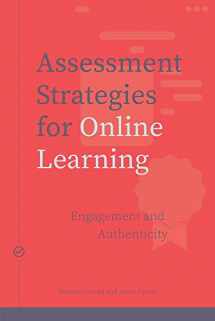
Assessment Strategies for Online Learning: Engagement and Authenticity (Issues in Distance Education)
Book details
Summary
Description
Assessment has provided educational institutions with information about student learning outcomes and the quality of education for many decades. But has it informed practice and been fully incorporated into the learning cycle? Conrad and Openo argue that the potential inherent in many of the new learning environments being explored by educators and students has not been fully realized. In this investigation of a variety of assessment methods and learning approaches, the authors aim to discover the tools that engage learners and authentically evaluate education. They insist that moving to new learning environments, specifically those online and at a distance, afford opportunities for educators to adopt only the best practices of traditional face-to-face assessment while exploring evaluation tools made available by a digital learning environment in the hopes of arriving at methods that capture the widest set of learner skills and attributes.


We would LOVE it if you could help us and other readers by reviewing the book
Book review



